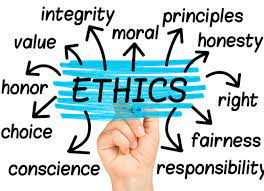
Professional ethics serve as the guiding principles that shape the conduct and behavior of individuals within a specific profession. These ethics establish a framework of moral standards and values that dictate how professionals interact with clients, colleagues, the public, and society at large. They encompass a wide range of principles and standards that are crucial for maintaining integrity, trust, and accountability within professional settings.
Importance of Professional Ethics
Professional ethics play a pivotal role in ensuring the credibility and trustworthiness of professionals in various fields such as medicine, law, engineering, finance, journalism, and many others. They provide a set of guidelines that promote responsible decision-making and help professionals navigate complex situations ethically.
1. Building Trust:Ethical behavior is the cornerstone of building trust between professionals and their clients or stakeholders. When individuals adhere to ethical standards, they create a sense of reliability and trust, fostering stronger relationships.
2. Maintaining Reputation: A professional’s reputation is closely tied to their adherence to ethical principles. Upholding high ethical standards enhances one’s reputation, while ethical misconduct can irreparably damage it.
3. Safeguarding Clients’ Interests: Professionals have a responsibility to act in the best interests of their clients or stakeholders. Ethical guidelines ensure that professionals prioritize the well-being and interests of those they serve.
4. Legal Compliance: Professional ethics often align with legal requirements, but they may go beyond legal obligations. Adhering to ethical principles minimizes the risk of legal issues and ensures compliance with laws and regulations.
5. Promoting Fair Practices: Ethical standards promote fairness, equality, and justice within professional settings. They discourage discrimination, bias, and unfair practices, fostering a more inclusive and equitable environment.
Key Principles of Professional Ethics
While specific ethical codes may vary across professions, several overarching principles are commonly emphasized:
1. Integrity: Upholding honesty, sincerity, and truthfulness in all professional dealings, maintaining consistency between words and actions.
2. Confidentiality: Respecting the privacy and confidentiality of clients or sensitive information entrusted to professionals, except when required by law.
3. Professional Competence: Committing to continuous learning, skill development, and maintaining a high level of expertise within one’s field to provide quality services.
4. Objectivity: Striving to make decisions and provide advice without bias, personal interests, or external influences that may compromise professional judgment.
5. Accountability: Taking responsibility for one’s actions, acknowledging mistakes, and being willing to rectify errors or misjudgments.
6. Respect: Treating all individuals with dignity, respect, and fairness, regardless of differences in race, gender, religion, or other characteristics.
Challenges and Dilemmas in Professional Ethics
Navigating ethical challenges is an inherent part of professional life. Professionals often encounter situations that present ethical dilemmas, where competing principles or interests conflict, making it challenging to make decisions that satisfy all ethical considerations.
1. Conflicting Interests: Balancing the interests of various stakeholders, such as clients, employers, and the public, can lead to ethical dilemmas where satisfying one party may adversely affect another.
2. Pressure and Conflicting Values: Professionals might face pressure to compromise ethical standards due to financial incentives, organizational culture, or conflicting personal and professional values.
3. Emerging Technologies: Advancements in technology often raise ethical concerns, such as privacy breaches, data manipulation, or the ethical use of artificial intelligence, challenging professionals to navigate uncharted ethical territories.
4. Globalization: In a globalized world, professionals might encounter ethical dilemmas stemming from cultural differences, differing legal frameworks, and diverse societal norms.
Implementation and Enforcement of Professional Ethics
To ensure adherence to ethical standards, professional bodies or organizations often establish codes of conduct or ethics that members are expected to follow. These codes serve as guidelines for behavior, outlining the principles and values expected of professionals within that particular field.
Additionally, ongoing education, training, and discussions on ethical issues contribute to raising awareness and promoting ethical behavior. Ethical committees or boards within organizations may oversee ethical compliance and address reported breaches or concerns.
Conclusion
Professional ethics are fundamental to maintaining trust, integrity, and accountability in various fields. Upholding ethical standards is not only a moral obligation but also crucial for the sustainability and reputation of professions. By embracing and applying ethical principles, professionals contribute to a more just, transparent, and responsible society. Ethical behavior is not a static concept; it requires continuous reflection, adaptation, and commitment to navigating the evolving landscape of professional responsibilities and moral challenges.



